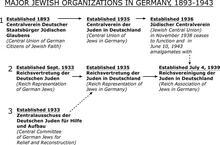Cora Berliner
Cora Berliner moved to Berlin from Hanover in 1919 to become a senior civil servant at the German Ministry of Economic Affairs. Between 1922 and 1924 she headed the Association of Jewish Youth Organizations in Germany. In the late 1920s Berliner took a teaching position as professor of economics at the Technical College in Berlin. In 1933, after having been dismissed by the Nazis, she began working for the Reich Representation of German Jews as head of their department for statistics. In 1939 Berliner became head of their committee for Emigration, Information, Statistics and Women’s Emigration, although she herself refused to emigrate. Throughout this period, she was also active in the League of Jewish Women. In June 1942 Berliner was deported to the East and killed.
Cora Berliner was an economist and social scientist who held leadership positions in several major Jewish organizations in Germany between 1910 and 1942. From 1912 to 1914, she was the secretary of the Association of Jewish Youth Organizations in Germany (Verband der Jüdischen Jugendvereine Deutschlands—VJJD), and from 1922 to 1924 she headed the organization. During her term of office, she consistently advocated for the rights of Jewish girls. As the Nazis came to power she was active in the League of Jewish Women (Jüdischer Frauenbund, JFB). Beginning in September, 1933 she held an important position in the Reich Representation of German Jews (Reichsvertretung der Deutschen Juden). One of her biographers even surmised that she was temporarily the secretary of this organization.
Character, Family & Education
Contemporaries of Cora Berliner remembered her as a highly intelligent woman who was serious about her work. She could be impatient with other people, but also with herself. She was slim and of medium height. Her eyes were dark and very vivacious; her hair was shiny black. She spoke in a high thin voice with a north-German accent. Always very busy, even her walking was hurried.
Born on January 23, 1890 in Hanover, Germany, Berliner was the youngest of five children and the third daughter of Manfred Berliner (1853–1931) and his wife Hanna (née Berend Dessau), who was born in Hamburg. Manfred owned and managed a business college in Hanover and published several books and articles about commercial subjects. The couple had married in 1881. Within the next nine years Hanna Berliner gave birth to Ida, Siegfried, Bernhard, Aenne and, in 1890, to Cora. Ida and Aenne came to the USA in the early 1900s after they married. Bernhard became a prominent psychoanalyst and emigrated to the USA in the mid-thirties. Siegfried lived in Leipzig, but during a business trip to the USA in 1938 decided not to return to Germany.
During the period that the Berliner children were growing up, the family ties to the USA were very close and there was frequent visiting, especially by the relatives from Washington to the family in Hanover. Three of the brothers of Manfred Berliner had emigrated to the USA and settled in Washington, DC.
Cora Berliner attended a girls’ school and received permission to study at university in 1909. Following her graduation she studied mathematics and, later, economics in Freiburg, Hanover, Berlin and Heidelberg. In 1916 she received her Ph.D. summa cum laude. The topic of her dissertation was “The Organization of Jewish Youth in Germany.”
German Ministry of Economics & Professorship
In 1919, when she was twenty-nine, Berliner moved to Berlin to take up a position of senior civil servant at the German Ministry of Economic Affairs (Reichswirtschaftministerium). At this time, German women had only just received the right to vote, and it was very rare for a woman to hold a leading administrative position.
Cora Berliner’s superior at the Ministry of Economic affairs was Hans Schäffer (1886–1967), who later became parliamentary secretary in the Finance Ministry. Although Hans Schäffer was married and had four children, they fell in love. Because they had to keep their relationship a secret, it was not until long after the death of Berliner that this love affair became generally known.
Berliner’s mother died in 1921 and her father remarried to Elsa Kahn. Manfred died in 1931 and in 1941 Elsa emigrated to Cuba.
In 1927 Cora Berliner was sent to London, where she worked for six months as an economic counselor for the German embassy. Shortly after her return to Berlin she received the offer of a chair at the Technical College (Berufspädagogisches Institut) in that city. She held this teaching position as a professor of economics until her dismissal in 1933, with the enactment of the “Law for the Restoration of the Professional Civil Service,” which the Nazis used to dismiss opponents and members of the so-called “non-Aryan” people. (Exceptions were made only for Jewish men who had served during World War I.)
Representing German Jews
In 1933 Cora Berliner started working for the Reichsvertretung der Deutschen Juden (Reich Representation of German Jews), founded in September 1933. In 1935 the name was changed to Reichsvertretung der Juden in Deutschland (Reich Representation of Jews in Germany). She was the head of the department of statistics and responsible for economic and social questions. During these years she wrote reports about the economic vicissitudes of German Jews after the Nazi rise to power, highlighting the especially difficult situation of Jewish women in her reports. At this same time she became active in the JFB.
While Berliner was never a Zionist, she went on an investigative trip to Palestine in 1936 because she wanted to know “how the people from Germany are living in Palestine, how they acclimatized and how they visualize their future.” She was curious about what people could learn from the experiences of German immigrants in Palestine. She stayed for three weeks, met German immigrants and visited numerous Jewish institutions and organizations. Upon returning to Berlin, she wrote a report for her friends and relatives, “Non-Political Trip to Palestine” (Unpolitische Reise nach Palästina), which she never published.
In 1939, Cora Berliner became head of the committee for Emigration, Information, Statistics and Women’s Emigration within the renamed Reichvertretung, the Reichsvereinigung der Juden in Deutschland (Reich Association of Jews in Germany). She was most concerned for the emigration of women and girls. Hans Schäffer, who had left Germany with his family in 1936, tried to persuade her to join him in Sweden, whence they could emigrate to the USA, where members of her family already lived. However, Berliner refused to exploit any opportunity which might permit her own emigration, saying: “My life would make no sense if I were to leave the people for whom I care so much.” Jewish emigration was prohibited by the Nazis in October, 1941. Berliner continued to work for various departments of the Reichsvereinigung and also within the Jewish Community of Berlin.
Deportation
Cora Berliner spent her free time, including the Jewish holidays, with her colleagues and friends, Hildegard Böhme, Hannah Karminski and Paula Fürst. In June 1942 she and Paula Fürst were deported to the East. One day before their deportation, Hannah Karminski met them for the last time. She wrote, “When I visited them on the last day, before they were deported, they were sitting outside in the sun, reading Goethe.”
Among the suppositions regarding Berliner’s fate is one that she was deported to Königsberg, and from there to Minsk. Nothing further is known.
Today, a street near the Memorial to the Murdered Jews of Europe in Berlin is named after her.
Selected Works
Die Organisation der jüdischen Jugend in Deutschland—ein Beitrag zur Systematik der Jugendpflege und Jugendbewegung, Berlin: Verlag des Verbandes der juedischen Jugendvereine Deutschlands, 1916.
Unpolitische Reise nach Palästina, 1936 (not published).
Badt-Strauss, Bertha. “Drei unvergessliche Frauen.” Publikationen des Leo Baeck Institute of Jews in Germany 2, no. 3 (1958): 103–107.
Dick, Jutta, and Marina Sassenberg. Jüdische Frauen im 19. und 20. Jahrhundert. Lexikon zu Leben und Werk. Reinbek bei Hamburg: Rowohlt, 1993.
Exler, Margarethe. “Cora Berliner (1890–1942): Ihre Rolle in der jüdischen Jugendbewegung insbesondere für die Organisation der weiblichen jüdischen Jugend.” In Zur Geschichte der jüdischen Frau in Deutschland, edited by Julius Carlebach, 167-181. Berlin: Metropol, 1993, 167–181.
Hildesheimer, Esriel. “Cora Berliner. Ihr Leben und ihr Wirken.” In Bulletin des Leo Baeck Instituts 67 (1984): 41–70.
Hirsch, Otto. “Cora Sara Berliner: 50 Jahre.” Jüdisches Nachrichtenblatt 1 (1940): 1.
Kaplan, Marion. Die jüdische Frauenbewegung in Deutschland. Organisation und Ziele des Jüdischen Frauenbundes 1904–1938, Hamburg: Christians, 1981.
Lowenthal, Ernst G. Bewährung im Untergang. Ein Gedenkbuch. Stuttgart: Deutsche Verlags-Anstalt, 1965.
Lowenthal, Ernst G. “Ein Immortellenkranz für Cora Berliner.” Mitteilungsblatt des Irgun Olej Merkas Europa (August 1984): 4.
Lowenthal, Ernst G. “Gewinnende Persönlichkeit. Cora Berliner—ihre Laufbahn wurde 1933 abrupt beendet.” Allgemeine Jüdische Wochenzeitung (January 1990).
Maierhof, Gudrun. “Cora Berliner.” In Zwischen Rebellion und Reform. Frauen im Berliner Westen, edited by Birgit Jochens and Sonja Miltenberger, 19–20. Berlin: Jaron-Verlag, 1999.
Maierhof, Gudrun. Selbstbehauptung im Chaos. Frauen in der jüdischen Selbsthilfe 1933–1943. Frankfurt/New York: Campus Verlag, 2002.
Zimmermann, Helmut. “Die Familien Berliner.” In Leben und Schicksal. Zur Einweihung der Synagoge in Hannover. Hanover: N.p., 1963.





